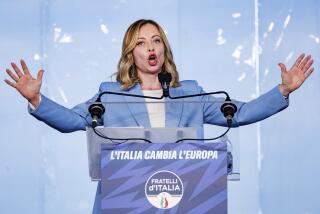The Italian rapscallion
- Share via
IN the 1980s, in an early indication of Silvio Berlusconi’s plans to conquer and transform the Italian television audience, one of his networks broadcast the game show “Colpo Grosso,” or “Big Hit.” Call it “Big Hit,” and it will become one -- so went the Berlusconi mantra.
On the show, contestants had to take off a piece of clothing for each wrong answer. Invariably, Alexander Stille says in his latest excoriation of the Berlusconi phenomenon, the male contestant ended up in his boxers and the female topless. That, in a nutshell, was the Berlusconi formula for success: Appeal to the lowest common denominator with titillating if vapid products and the audience is yours.
With a sharp knife and clear eye, Stille, in “The Sack of Rome: How a Beautiful European Country With a Fabled History and a Storied Culture Was Taken Over by a Man Named Silvio Berlusconi,” has dissected the remarkable, revolting story of the rise of the former (and future?) prime minister of Italy, and the political-cultural revolution that he fathered, for good and mostly for bad. Elected twice to head the Italian government and ejected twice from that post, Berlusconi represents what Stille calls a new charismatic model of governance for the TV age, one that skirts the law, engages in blatant deception and legislates for its own financial and political benefit.
Even for those students of Italian politics who have followed all or part of Berlusconi’s career, from his early days as a cruise ship crooner to his current status as media magnate and one of the planet’s richest individuals, the compilation here of many unsavory anecdotes and documented details of the man and his evolution make for fascinating and, at times, chilling reading.
Stille, a journalism professor at Columbia University who has written extensively on Italy, is unabashed in his contempt for Berlusconi. He has abundant ammunition. “The Berlusconi story is one of the great political adventures of the late twentieth century, an astonishing example of what happens when media, money and politics combine forces in a society with almost no rules,” he writes. “The election of the richest man and the largest media owner, who is also a defendant in numerous criminal trials, to the highest public office has created a bizarre and anomalous situation and led to a new model of power in the heart of Europe.”
It would be, Stille says, as if Bill Gates had purchased several major U.S. television networks while also running the government, making laws to his liking.
In Stille’s telling, the Berlusconi phenomenon is less baffling, more explicable and still thoroughly dismaying. Stille’s assessment is one-sided in the sense that he does not like Berlusconi and sees little that is positive in the former prime minister’s stewardship of the country, a notion with which many Italians would disagree. But the international view of Berlusconi largely supports Stille’s.
In his quick climb to political power during the 1990s, Berlusconi walked into an arena badly in need of reform. He seized an ossified, corrupt system held prisoner to paternalistic, traditional elites and set about transforming it. He “re-educated” the Italian public using his media resources, creating a consumer culture in which people would want to “buy” him as a leader the way they bought dog food or a new car.
“Think of how many women there are out there who would like to go to bed with me, but don’t know it,” Berlusconi has said. “Life is a problem of communication.”
Berlusconi succeeded in transforming the Italian corporate ethic and Italian politics -- both needed overhauling, to be sure, but Stille argues that under Berlusconi what happened was abuse, not reform. His motives, Stille tells us, did not arise out of patriotic altruism but almost exclusively out of self-promotion and self-enrichment.
Berlusconi’s genius was in reading the market and then milking it. He helped create an Italy in which personality, celebrity and money replaced ideology. Stille writes at one point that Berlusconi, like any narcissist, believes the world revolves around him; the difference is that Berlusconi bent reality to fit his narcissistic fantasy so that, in fact, much of Italy does revolve around him.
Stille shows how Berlusconi made his first millions in real estate by building tacky housing tracts near Milan. Berlusconi then set his sights on TV, at the time still greatly strictured by sluggish state controls, and gradually bought or built a nationwide network that encompassed most private commercial television. In many ways, he created commercial TV in Italy and, as part of the package, added to his fast-growing empire with the country’s largest advertising firm. The combination, Stille says, amounted to nothing short of a license to print money. (Later, when Berlusconi became prime minister and thus head of the government, his control expanded to nearly 90% of Italian television by virtue of his overseeing state TV.)
Next came politics. He set up a political party, Forza Italia (“Go, Italy,” after a soccer slogan), as though it were a company; his politicians were trained like ad salesmen and instructed to exude confidence at all times (whether or not they had reason to). By the time Berlusconi won office, most of his party’s legislative posts were held by former employees of his who had no experience in public service.
Tapping into a growing Italian mistrust of and dislike for politics, and taking advantage of the political void created when a huge corruption scandal in the early 1990s undermined traditional big parties, Berlusconi attracted an odd alliance of smaller factions, including Italy’s neo-Fascists. Together, that group and his Forza Italia won a relative majority in Parliament on March 28, 1994. He would fall from power before the end of the year but win election again in 2001 and become the longest-serving prime minister in Italy since World War II. (His second term ended this year with defeat in April.)
Many of the strategies that Berlusconi used to amass his fortune and cult-of-personality status continued to serve him in office, Stille notes. He was never bashful about using the machine of state to protect himself from the many ethical and conflict-of-interest probes that dogged him; he continued to operate as though he were the best, brightest and sexiest man in Italy (thanks in no small part to his frequent visits to plastic surgeons).
Stille sees Berlusconi as a self-styled master of the Big Lie. The politician repeats what he wants to be true with enough frequency and conviction that his audience starts to believe it. The technique brought him to power and held him there, Stille says. He will hammer away at points that are patently and preposterously untrue, claiming the media are dominated by his leftist enemies (though he, in fact, controls most of the media) and railing against the threat of communism even though the Italian Communist Party was defanged years ago. In that sense, he is a brilliant communicator, a demagogue.
Stille quotes Berlusconi, who was speaking even as prosecutors in Milan were subpoenaing him in a bribery case: “The recovery of Italy is called Forza Italia. In point of fact, it’s called Silvio Berlusconi,” he said. “Who would I be if I couldn’t be Berlusconi? The son of Berlusconi.”
Stille is most pointed when he rips apart the myths that Berlusconi has perpetuated about himself. Even the oft-told tale of his rags-to-riches rise is bogus, Stille says. The Salesian Catholic school for boys that he attended and often portrays like a scene out of Dickens was in fact one of the most elite. His father was not a poor clerk but a well-to-do bank manager. And Stille raises this question: Berlusconi is an excellent salesman, to be sure, but is he a good businessman? They are, after all, separate categories. Most significant, Stille shows that Berlusconi, who is far from being the outsider he claims to be, constructed a fiercely loyal, all-male inner circle that paved his way and included, among others, a corrupt lawyer and an even more corrupt former prime minister (Bettino Craxi), as well as members of the pro-Fascist P2 Masonic Lodge and, it is alleged here and elsewhere, the Mafia.
If the tale of Berlusconi has not been sufficiently disheartening, Stille ends on an even more pessimistic note: We are all Berlusconi, he says. To regard Berlusconi as an isolated phenomenon is a mistake. The formula of joining money, celebrity and TV, and the strategy of using popular elections to turn around and undermine democracy, have become practices in places as far and wide as Russia and the United States. “Silvio Berlusconi as a political figure may come and go, but the Berlusconi phenomenon is, in all likelihood, here to stay,” Stille writes.
Berlusconi may have lost reelection this spring, but nearly half of Italy voted for him. *
More to Read
Sign up for Essential California
The most important California stories and recommendations in your inbox every morning.
You may occasionally receive promotional content from the Los Angeles Times.











